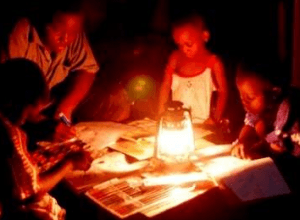Dumsor causes huge loss to businesses – Research
 Dr Charles Ackah, the Senior Research Fellow of the Institute of Statistical, Social, and Economic Research (ISSER) Tuesday said the poor quality of electricity supply has been a severe constrain on businesses in the country.
Dr Charles Ackah, the Senior Research Fellow of the Institute of Statistical, Social, and Economic Research (ISSER) Tuesday said the poor quality of electricity supply has been a severe constrain on businesses in the country.
He said research conducted by some members of the Institute on about 1, 250 micro and small enterprises (MSEs) that makes over two-thirds of all jobs in the country, indicated that, voltage fluctuations and power outages in the country halt production, spoil goods-in-process, and damage equipments.
Dr Ackah said findings from the study showed that inadequate power supply lowers annual sales of a business by 37-48 per cent making the country lose production worth $2.2 million per day or $57.2 million per month and $686.4 million annually.
He stressed that these outcomes translate to around two per cent of annual Gross Domestic Product (GDP) lost due to the electricity crisis.
He revealed that firms that do not have access to sufficient electricity have lower output or sales compared to those with sufficient electricity.
Also, firms that own or have access to standby generators do better than their counterparts without a generator, he said.
Dr Ackah said that total factor and labour productivity, firm competitiveness, investment, profits and employment are all affected by electricity insecurity.
“The million dollar question is how much the deep power crisis that Ghanaians are currently living through costing the economy”, he asked.
Mr Ishmael Ackah, the Head of Policy Unit, Africa Centre for Energy Policy (ACEP) said it is unfortunate to notice that despite the advantages of frequent power supply, Ghana has been struggling to provide reliable and consistent power supply since the first crisis in 1983.
He said another cost of the power crisis has been natural gas and light, as well as crude oil supply challenges.
“The fact that about 88 per cent of gas in the country is from the power sector and the country currently needs about 191 million standard cubic feet per day means we not getting enough as a country that wants to halt power crisis”, he said.
Mr Ackah said as at the end of October 2014, the government’s total indebtedness to the Electricity Company of Ghana (ECG) was 62 per cent of ECG’s total debt.
“Government must pay ECG its debts, so that ECG can pay Volta River Authority (VRA) and for VRA to be able to pay Ghana Gas Company”.
The Head of ACEP recommended that “either ECG is divided into two different bodies where each competes with the other for more patrons or the government sells ECG to private businesses to operate.”
He also urged the government to curtail distributional loses and operational efficiency performance and also operationalize annual weather forecast to reduce loss in organisational activities.
Source: GNA
